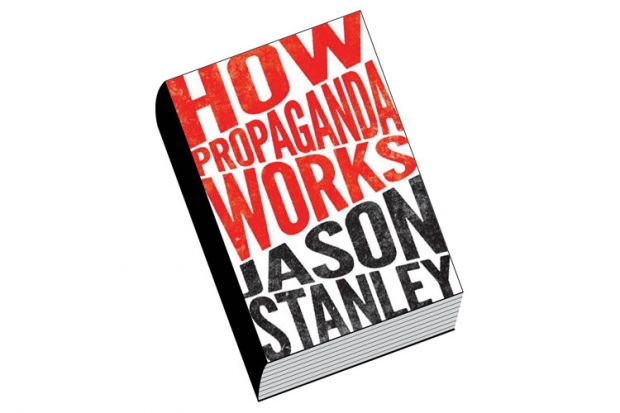Now, I may only be a bear of little brain, but it does seem to me that a book called How Propaganda Works should be about how propaganda works. But no, philosopher Jason Stanley has decided his book should be about the failings of liberal democracies and only tangentially touch on propaganda.
“How could one grow up naively into adulthood in a state that professes to follow liberal democratic ideals, but in which there is overwhelmingly illiberal practice?” Stanley asks plaintively, before answering: “To maintain stability, the propagandistic use of the liberal democratic ideals will be required to cover up the significant gap between ideals and reality. This is the species of propaganda that concerns me in this book.”
In Stanley’s world, “Politicians must also be, for example, rationally consistent, objective, and logical” and so, to help them get there, here is this attractive tome apparently aimed at the general reader. Additionally, the author peppers the text with questions or speculations, adopting a kind of meta-narrative that is, frankly, tiresome. And then there’s the repetition. Now, I know where both these literary traits come from: philosophical logic. Here, arguments should be deduced from premises that already include all the content for the conclusion, and approved reading consists of Aristotle, Frege and Wittgenstein. “The Frege-Geach problem is that declarative sentences can be embedded in more complex constructions,” Stanley explains before promising to employ “formal semantics and pragmatics”. Yet later (don’t ask me, I’m a teddy bear!) he says “the search to make ordinary communication akin to reasoning with schematic letters in logic is futile”.
Added to his logic are insights from a collection of books from a project on “democratic citizenship” that came into his hands via his parents – the result being a hotchpotch of politically correct observations. Take “welfare”. The word “always conveys a problematic social meaning whenever it is used”. Or “talking about black Americans and welfare at the same time”: propagandistic – and cunning, as it can appear to be done in a well-meaning way. Remember, true claims made sincerely can be just as bad as false ones made insincerely. (“The theoretical explanation involves the relationship between propaganda and ideology.”) Academics are often the worst offenders. This is no coincidence because, Stanley explains, propaganda works by exploiting the notion of the expert.
Another big issue: voter registration rules. These now exclude millions of US voters – yet between 2000 and 2012 there were only 10 cases of impersonation. So are the rules a form of propaganda directed at the black underclass? You betcha. Next: pornography is propaganda against women. Finally: racist speech is propaganda against blacks. Such things create “flawed ideological beliefs to the effect that the perspectives of a designated group are not worthy of reasonable consideration”.
Which reminds Stanley: “The well-established link between dehumanizing propaganda and genocide should make all of us wary when a group of our fellow humans is presented as subhuman animals, insects, or vermin.”
That said, we should not let church projects aimed at helping sick children off the hook either. They are propagandistic because they support an institution whose values are at odds with liberal ones. “On this basis, I may kidnap your children, on the grounds that it is the most reasonable thing to do for their overall welfare.” Stop! Don’t use that word, Jason!
Martin Cohen is editor of The Philosopher.
How Propaganda Works
By Jason Stanley
Princeton University Press, 376pp, £20.95
ISBN 9780691164427 and 9781400865802 (e-book)
Published 24 June 2015
Register to continue
Why register?
- Registration is free and only takes a moment
- Once registered, you can read 3 articles a month
- Sign up for our newsletter
Subscribe
Or subscribe for unlimited access to:
- Unlimited access to news, views, insights & reviews
- Digital editions
- Digital access to THE’s university and college rankings analysis
Already registered or a current subscriber?




